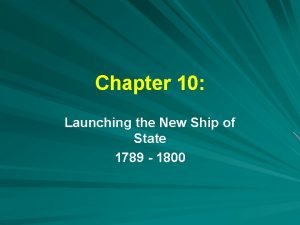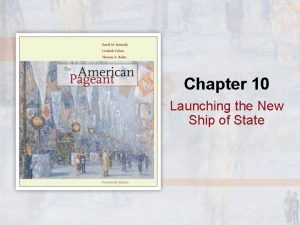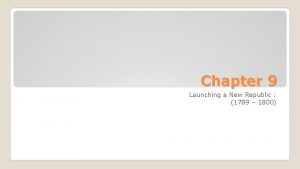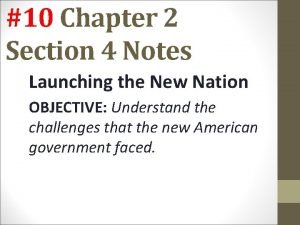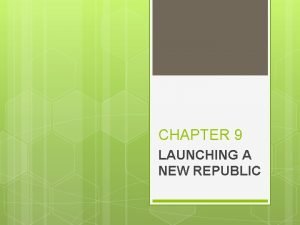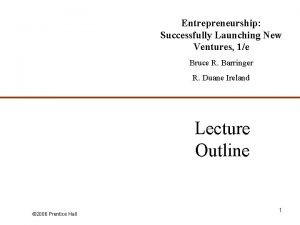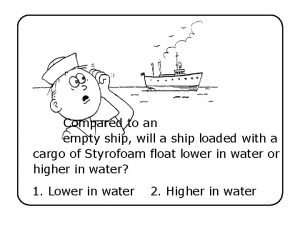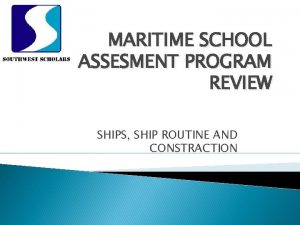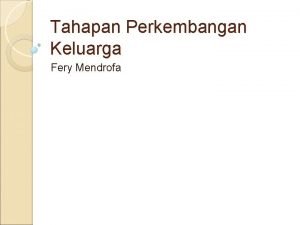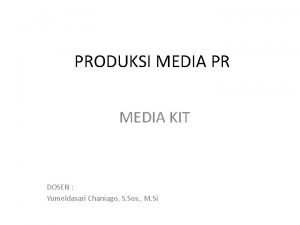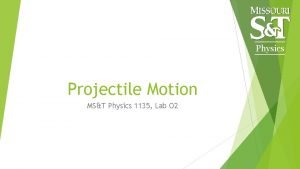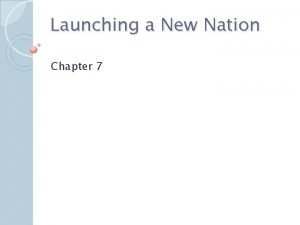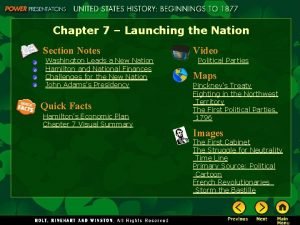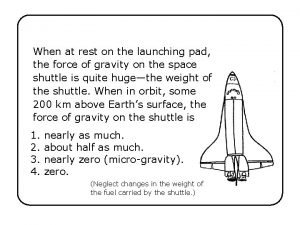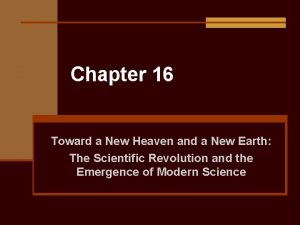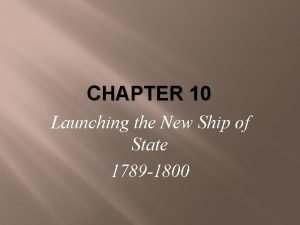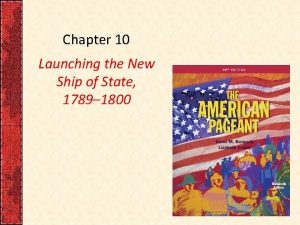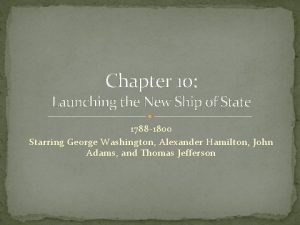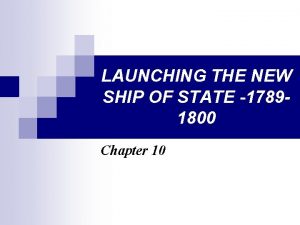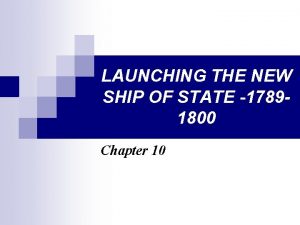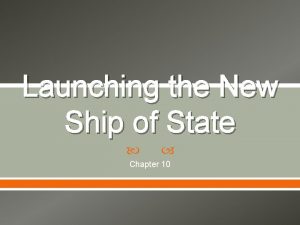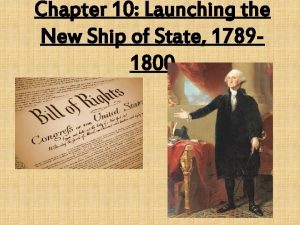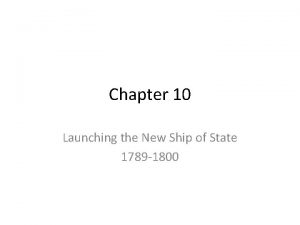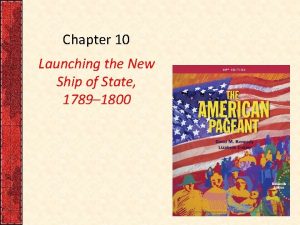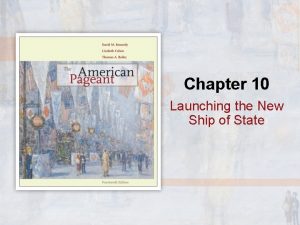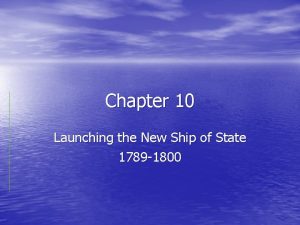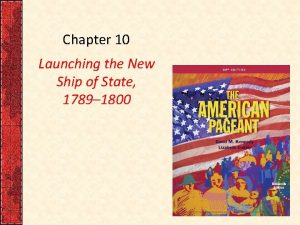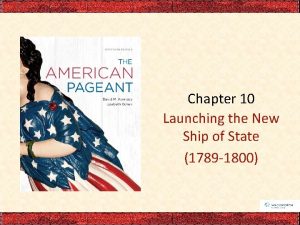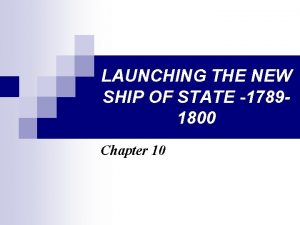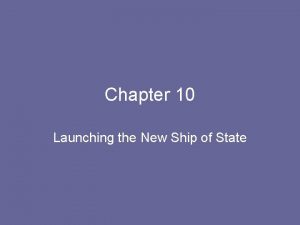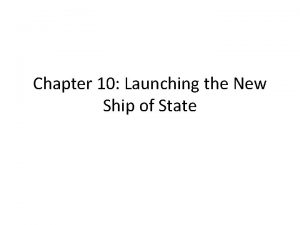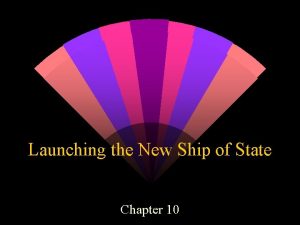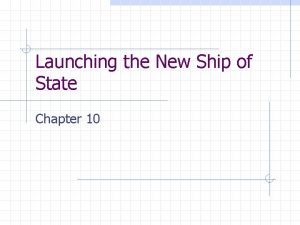Chapter 10 Launching the New Ship of State
















































- Slides: 48

Chapter 10 Launching the New Ship of State 1789 - 1800

Crowds cheer George Washington as he arrived in New York City to be inaugurated as the nation’s first president. Americans had confidence in Washington because he had commanded American troops during the Revolution. He was the nation’s greatest hero; respected and loved by Americans in all parts of the country

George Washington took the oath of office as President on April 30, 1789. Americans looked to him to make the new government work.

How to address the President • When first Congress met in 1789, Vice President John Adams asked a interesting question: How should the people address the President? • The debate went on for weeks • Proposals included: “His Elective Highness”, “His Elective Majesty”, “His Most Benign Highness”, “President of the United States and Protector of Their Liberties” • Congress , thanks to former Antifederalist decided on the simple designation “President of the United States”

President George Washington • As the first President, he knew he was setting an example for future generations. • “There is scarcely any part of my conduct which may not hereafter be drawn into precedent. ” • Precedent – an act of decision that sets an example for others to follow

cabinet • groups of officials who head government departments and advise the president • Secretary of State – Thomas Jefferson • Secretary of the Treasury – Alexander Hamilton • Secretary of War – Henry Knox • Attorney General – Edmund Randolph

The Bill of Rights (1791) • First ten amendments to the U. S. Constitution. • The amendments secure key rights for individuals and reserve to the states all powers not explicitly delegated or prohibited by the Constitution. • Intended to protect individual rights against the potential tyranny of a strong central government

Judiciary Act of 1789 • Organized the federal legal system, established the Supreme Court, federal district and circuit courts, and the office of attorney general. • Called for Supreme Court to have one Chief Justice and five Associate Justices.

Alexander Hamilton

Hamilton and the National Debt • • During the Revolution, both the national government and individual states needed money to pay soldiers and buy supplies. They borrowed from foreign countries and ordinary citizens. Just like today, the government borrowed money by issuing bonds (a certificate that promises to repay the money loaned plus interest on a certain date) The total sum of money a government owes is called the national debt. Hamilton insist that all debts be repaid – otherwise who would lend money to the United States in the future if the country did not pay its old debts? Hamilton wanted to buy up all bonds issued by the national and state governments before 1789. He planned to sell new bonds to pay off the old debts. When the economy improved, the government would be able to pay off the new bonds.

Alexander Hamilton • 1. 2. 3. 4. 5. • Hamilton’s financial plan for strengthening the economy and bolstering national credit proposed all of the following funding the national debt assuming state debts tariffs a low protective wall around infant industries establishing a national bank believed that a limited national debt was beneficial, because people to whom the government owed money would work hard to make the nation a success.



• • • Bank of the United States Hamilton argued a national bank would be both “necessary and proper” (invoking the Constitution’s elastic clause) Government would be a major stockholder U. S. Treasury would deposit surplus monies (money collected in taxes) Would hold the government’s money – and would stimulate business Would print urgently needed paper money Supported in the North Opposed in agricultural South Created in 1791 In Philadelphia – chartered for 20 years


Excise Tax • Tax on goods produced domestically. • Excise taxes, particularly the 1791 tax on whiskey, were a highly controversial component of Alexander Hamilton’s financial program.

Whiskey Rebellion of 1794 • Challenge to new federal government’s authority • arose in southwestern Pennsylvania when the federal government levied an excise tax on whiskey • Army suppressed the rebellion • Washington’s quick response and the new government’s show of strength proved to Americans that their new government would act firmly in times of crisis


Political Parties • Opposition by Thomas Jefferson and James Madison to the financial plan of Alexander Hamilton resulted in the formation of political parties. • Political parties (organized opposition to government) seemed disloyal to many early Americans • Political parties – a group of people that tries to promote its ideas and influence government (also backs candidates for office) • “loyal opposition” – party out of power

The First Political Parties Federalists Democratic-Republicans • Led by Hamilton • Wealthy and well educated should lead nation • Strong central government • Emphasis on manufacturing, shipping, and trade • Favored protective tariff • Loose interpretation of the constitution (loose construction) • Favored national bank • Pro-British • Led by Jefferson • People should have political power • Strong state governments • Emphasis on agriculture • Opposed protective tariff • Strict interpretation of the constitution (strict construction) • Opposed national bank • Pro-French


Reign of Terror • Ten-month period of brutal repression when some 40, 000 individuals were executed as enemies of the French Revolution. • While many Jeffersonians maintained their faith in the French Republic, Federalists withdrew their already lukewarm support once the Reign of Terror commenced.


Washington’s Neutrality Proclamation of 1793 • Issued by George Washington, it proclaimed America’s formal neutrality in the escalating conflict between England France • enraged pro-French Jeffersonians. • was based on calculations of American self-interest.

“Citizen” Edmond Genet • “Citizen” Genet contributed to polarization of the new nation by trying to recruit American privateers to attack the British and Americans to attack Britain’s Spanish allies in Florida. • His actions threatened American neutrality in the war between France and Britain • President Washington demanded his withdrawal – he was replaced

Miami war chief Little Turtle • Western Indian Confederacy (8 Indian nations – most notably the Miami and Shawnee) armed by British • Indians resist white settlers moving into the Northwest Territory • Defeated General Arthur St. Clair – one of worst defeats in frontier history

General “Mad” Anthony Wayne • recalled from civilian life by President Washington to lead the expedition against the Miami Confederacy; • recruited, trained, and led the U. S. Army • led the U. S. army in a decisive victory over the Miami

Battle of Fallen Timbers • Decisive battle between the Miami Confederacy and the U. S. Army. • British forces refused to shelter the routed Indians, forcing the Indians to attain a peace settlement with the United States.

Treaty of Greenville (1795) • The Miami (tribe) and 11 other Indian nations signed the treaty with the U. S. • They gave up land that would later become the southern half of Ohio in return for $20, 000 if they kept the peace


British ignore U. S. neutrality • Almost 300 American merchant ships seized • American seamen impressed into service on British ships • Jeffersonians call for war • Hamilton wants economic development not war with the world’s mightiest commercial empire

Jay’s Treaty • Negotiated by Chief Justice John Jay in an effort to avoid war with Britain • The treaty included a British promise to evacuate outposts on U. S. soil and pay damages for recently seized American vessels • in exchange for which Jay bound the United States to repay pre. Revolutionary War debts and to abide by Britain’s restrictive trading policies toward France. • Energized the Democratic. Republicans

Pinckney Treaty • Signed with Spain which feared an Anglo. American alliance • granted Americans free navigation of the Mississippi River and the disputed territory of Florida.

Washington’s Farewell Address (1796) • George Washington’s address at the end of his presidency, warning against “permanent alliances” with other nations. • Washington did not oppose alliances, but believed that the young, fledgling nation should forge alliances only on a temporary basis, in extraordinary circumstances.

Legacy of President George Washington • Central government solidly established – Cabinet – Financial system sound – Respect for national government established • Set precedent of twoterm tradition • Kept nation out of overseas entangling alliances and foreign wars • “Father of his country”

Presidential Election of 1796

Presidential Election of 1796 President John Adams Vice President Thomas Jefferson

XYZ Affair • French object to Jay’s Treaty and began to seize American ships in the West Indies • Americans call for war • In an effort to avoid war, Adams sent diplomats to Paris to discuss the rights of neutrals • XY & Z demanded that the U. S. loan France $12 million and a $250, 000 bribe to French Foreign Minister Talleyrand • American delegates found these demands unacceptable and answered “not a sixpence” – but in the exaggerated oratory of the day, the response became “Millions for defense, but not one cent for tribute!”



Quasi- War with France • Undeclared war fought mostly at sea between the United States and French Republic from 1798 -1800.

Convention of 1800 • • • Agreement to formally dissolve the United States’ treaty with France, originally signed during the Revolutionary War. Alliance had no expiration date France and Britain at war – if U. S. allied with France, the U. S. navy could possibly be crushed by Britain’s strong navy But a neutral U. S. would be able to supply France with desperately needed grain Both nations had the same goal in mind Resulted in peaceful cessation of the alliance between both nations


• Alien Laws (1798): Acts passed by a Federalist Congress raising the residency requirement for citizenship to fourteen years and granting the president the power to deport dangerous foreigners in times of peace • Sedition Act (1798): Enacted by the Federalist Congress in an effort to clamp down on Jeffersonian opposition, the law made anyone convicted of defaming government officials or interfering with government policies liable to imprisonment and a heavy fine. The act drew heavy criticism from Republicans, who let the act expire in 1801.

Virginia and Kentucky Resolutions • Statements secretly drafted by Jefferson and Madison for the legislatures of Kentucky and Virginia. • Argued that states were the final arbiters of whether the federal government overstepped its boundaries and could therefore nullify, or refuse to accept, national legislation they deemed unconstitutional.

Jefferson’s view of people

Hamilton’s view of people

 Chapter 10 launching the new ship of state
Chapter 10 launching the new ship of state An exciseman cartoon
An exciseman cartoon Launching the new republic
Launching the new republic Chapter 2 section 4 launching the new nation
Chapter 2 section 4 launching the new nation Chapter 9 launching a new republic
Chapter 9 launching a new republic Entrepreneurship successfully launching new ventures
Entrepreneurship successfully launching new ventures Difference between empty ship and loaded ship
Difference between empty ship and loaded ship Ship ship routines and construction
Ship ship routines and construction Tahap perkembangan keluarga keperawatan keluarga
Tahap perkembangan keluarga keperawatan keluarga Tony and sue are launching yard darts
Tony and sue are launching yard darts Contoh penulisan backgrounders
Contoh penulisan backgrounders Projectile apparatus with impact board and launching ramp
Projectile apparatus with impact board and launching ramp Launching the nation section 1 answers
Launching the nation section 1 answers Personal entrepreneurial competencies meaning
Personal entrepreneurial competencies meaning Bga safe winch launching
Bga safe winch launching Retirement stage of family life cycle
Retirement stage of family life cycle Launching the nation section 1 answers
Launching the nation section 1 answers When at rest on the launching pad the force
When at rest on the launching pad the force Launching customer
Launching customer Chapter 16 toward a new heaven and a new earth
Chapter 16 toward a new heaven and a new earth Hình ảnh bộ gõ cơ thể búng tay
Hình ảnh bộ gõ cơ thể búng tay Frameset trong html5
Frameset trong html5 Bổ thể
Bổ thể Tỉ lệ cơ thể trẻ em
Tỉ lệ cơ thể trẻ em Voi kéo gỗ như thế nào
Voi kéo gỗ như thế nào Tư thế worm breton
Tư thế worm breton Chúa sống lại
Chúa sống lại Môn thể thao bắt đầu bằng chữ đua
Môn thể thao bắt đầu bằng chữ đua Thế nào là hệ số cao nhất
Thế nào là hệ số cao nhất Các châu lục và đại dương trên thế giới
Các châu lục và đại dương trên thế giới Công của trọng lực
Công của trọng lực Trời xanh đây là của chúng ta thể thơ
Trời xanh đây là của chúng ta thể thơ Cách giải mật thư tọa độ
Cách giải mật thư tọa độ 101012 bằng
101012 bằng Phản ứng thế ankan
Phản ứng thế ankan Các châu lục và đại dương trên thế giới
Các châu lục và đại dương trên thế giới Thơ thất ngôn tứ tuyệt đường luật
Thơ thất ngôn tứ tuyệt đường luật Quá trình desamine hóa có thể tạo ra
Quá trình desamine hóa có thể tạo ra Một số thể thơ truyền thống
Một số thể thơ truyền thống Bàn tay mà dây bẩn
Bàn tay mà dây bẩn Vẽ hình chiếu vuông góc của vật thể sau
Vẽ hình chiếu vuông góc của vật thể sau Biện pháp chống mỏi cơ
Biện pháp chống mỏi cơ đặc điểm cơ thể của người tối cổ
đặc điểm cơ thể của người tối cổ Thế nào là giọng cùng tên? *
Thế nào là giọng cùng tên? * Vẽ hình chiếu đứng bằng cạnh của vật thể
Vẽ hình chiếu đứng bằng cạnh của vật thể Fecboak
Fecboak Thẻ vin
Thẻ vin đại từ thay thế
đại từ thay thế điện thế nghỉ
điện thế nghỉ
